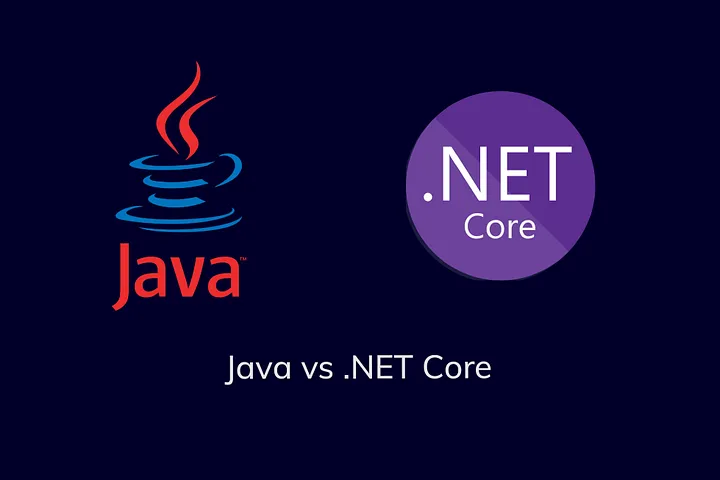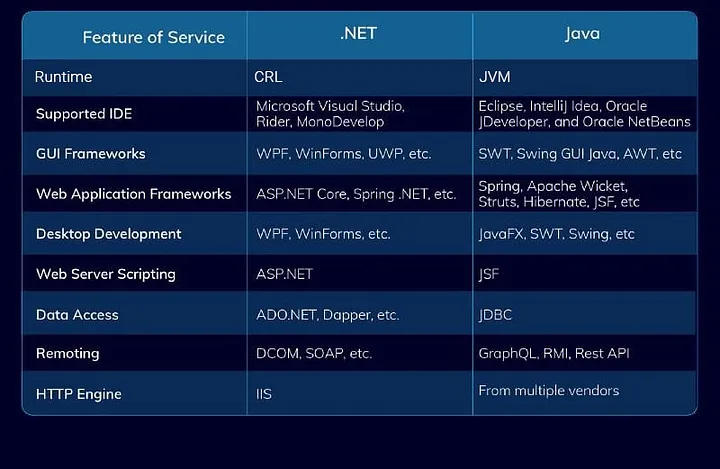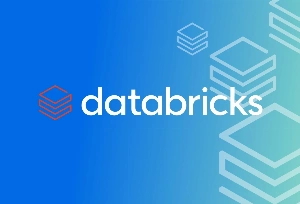.NET vs Java: Some Similarities
Preferences and technologies evolve over time. The value of programming languages fluctuates when firms consider expanding their technological capabilities. In any case, deciding among two decent programming languages is exceedingly tough. To begin with, both technologies are widely used to create large-scale applications and software, and the answer to the question “Java vs .NET — which is better?” depends exclusively on the operational requirements of your business. Both technologies are object-oriented and offer enterprise-level development possibilities for almost every application type. Modular structure code guarantees flexibility, easier debugging, and the ability to reuse the code. They are perfect for working with complex architectures and high-load systems, and both of them are used by widely-known companies.
Java: Google, Netflix, Instagram, Spotify, LinkedIn, eBay, etc.
.NET: Microsoft, Intel, Dell, StackOverflow, and others.
Java vs .NET: Core Differences
Fundamentals and OS
Java is a programming language developed by James Gosling and released in 1995 by SunMicrosystems. Although Java was first released 27 years ago, it is as prevalent as ever: according to a Stack Overflow Developer Survey, it is placed fifth among currently the most popular languages.
Java works in a rather curious way since when you code, it compiles into bytecode which the Java Virtual Machine (JVM) transforms to suit the various devices. It turns out that the developer only requires one code for different platforms.
Java is utilized in almost all industries like IoT, eCommerce, online banking, stock trading, and even in Big Data, even though its popularity in that field hasn't yet peaked. The language is considered to have a shallow learning curve and a bunch of advantages and utilities.
Whereas .NET developed by Microsoft is an open-source framework and is targeted towards Microsoft product users. The framework was designed specifically for Microsoft when it was initially released in 2002. Then in 2016, Microsoft released.NET Core, which improved the framework's market position.
An up-to-date version of .NET Core is. NET 6 has many features that are really useful for building web applications, both mobile and cloud applications and also has open-source, cross-platform and requires no licensing costs. .Net 6 follows an object-oriented approach and Basic.NET tools, as well as add-ons, libraries, and third-party tools, are available for creating and modifying programs for instant use. It has proven to be a serious contender for Java. Furthermore, both Java and .NET can use Linux and Windows as servers.
IDE & Tools
Integrated Development Environment is a software tool that includes other important tools for a developer to build and test applications. The default IDE for .NET applications in Visual Studio. The feature of creation at design time enhances fast development and helps in the customization of the apps’ appearance and behavior. However, for even faster development, engineers buy ReSharper or Rider. JetBrains Rider is acquiring more and more popularity among .NET developers. It’s a cross-platform solution that can operate with the same stability on multiple platforms (Windows, macOS, and Linux). Unlike in the case with Microsoft Visual Studio, there is no need to buy additional solutions for macOS and Linux if you decide to switch. Though the MacOS version includes less functionality compared to Windows. The Rider environment includes most of the features of the popular Visual Studio extension for .NET developers — ReSharper. Rider has an impressive set of refactoring, code validation, and context actions for all the languages and technologies it supports. Visual Studio also has sets of refactoring and code error checking, but much more limited than those provided in Rider and ReSharper.
Whereas for Java developers there are four main IDEs: Eclipse, IntelliJ Idea, Oracle JDeveloper, and Oracle NetBeans. The platforms are user-friendly and can be used even by beginners to write and test the code.
Language Support
With the help of JNI instruments, Java can integrate with other languages and Java applications can operate on a wide range of operating systems. Java may support a variety of languages, including Ruby, Scala, Python, Groovy, and Kotlin. Kotlin, which is completely compatible with Java, has been gaining a lot of popularity recently. It allows developing projects in Java and Kotlin simultaneously. As a result, new functionality can be written in Kotlin without any losses in old Java projects.
The.Net framework is capable of supporting languages such as C# and C++, which are ideal for backend development and web services.
Nowadays, it supports around 20 languages itself which makes the approach to business apps development more flexible. You may program in whatever language you want with this, including Perl, C#.NET, Vb.NET etc. If you need to produce code that is specific to the Windows operating system, this tool comes in useful.
Consequently,.NET may be described as a multiprogramming environment, whereas Java is based on a single programming language.
Java vs .NET Performance and Efficiency Comparison
For years there wasn’t a big gap in performance between the applications built with these technologies.
However, Java does not need to be transformed into Machine language until the code is run. It is based on Write Once Run Anywhere (WORA) .In.NET development, contrastingly, the code is constructed first and then operates on the system. That is one of the reasons why C#, as a programming language, consistently outperforms others in a dynamic context. The prior Java versions do not support the simple and straightforward data structure and switch case. Character variables in C# applications, in addition to native generic data, are essential for switching NET's case support. In addition, ASP.NET supports Linq (Language Integrated Query), but Java does not. NET ultimately allows you to optimize your code and write less code, which improves performance. Relatively shortcode also implies less time spent maintaining it and simpler debugging. Both developers and clients will be interested in such functionalities.
Though the optimization and investments that have been made by Microsoft, changed the game, it is possible to trace this huge difference between ASP.NET and Java — it has become blazingly fast.
Security
When it comes to security, both.NET Core and Java shine. These frameworks allow you to sign your code and run it in a sandbox environment. Previously, Java had certain security issues because of open-source, but these were quickly resolved and more security measures were introduced. It's quite improbable that you'll make a mistake in Java that results in a reach.
When it came to.NET Core, when it was closed-source, it was more secure. Despite the fact that this framework no longer has this privilege, it is still a comprehensive development platform. It is Microsoft's job to maintain it safe as they designed it. The platform may also provide round-the-clock support to their businesses.
Market Share
Currently, Java is one of the most popular technologies taking first place in various rankings. The availability of a big number of free training resources, a big community, and a relatively shallow learning curve, attracts more and more newbies every year. The number of vacancies on Indeed.com and Monster.com shows that Java developers are in higher demand than .NET developers.
The accomplishments of.NET Core, on the other hand, are not inconsequential. With about two million active websites,.NET Core is the most popular technology on the Internet. It is ranked top in numerous nations, including the United States, the United Kingdom, China, and many more. Moreover, .NET Core is one of the most popular networks among developers worldwide, according to a CodinGame Developer Survey done in 2021.







